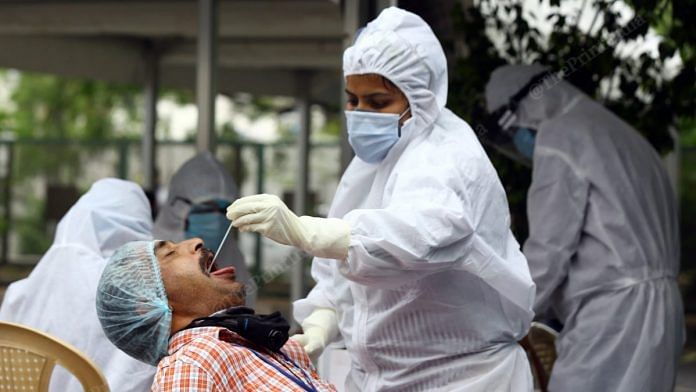New Delhi: The risk of delayed acute complications after SARS-CoV-2 infection in patients who did not need to be hospitalised is very low, a new study published in the Lancet journal said.
However, persistent symptoms — such as breathing issues and migraines — in these patients may lead to increased visits to general practitioners or outpatient clinics in the six months following infection, the researchers found.
The team from University of Southern Denmark assessed the risk of initiating medication and receiving a hospital diagnosis for a new condition by comparing individuals who tested positive for SARS-CoV-2 with individuals who had a negative test during the first wave of the pandemic in Denmark.
Results published in The Lancet Infectious Diseases journal found SARS-CoV-2 positive individuals were at a slightly increased risk of initiating medications to help improve breathing and alleviate migraines, and had a slightly increased risk of receiving a first diagnosis for breathing problems and blood clots in the veins.
“Until now, most research investigating long-term complications from COVID-19 has been focused on hospitalised patients. But the reality is that the majority of people with COVID-19 are not admitted to the hospital,” Anton Pottegård from the University of Southern Denmark, one of the authors of the study, said in a statement.
“Our study finds a very low risk of severe delayed effects from COVID-19 in people who didn’t require hospitalisation for the infection. However, our research provided evidence for some long-term effects that did not require hospitalisation or the use of new medicines, which we found reflected in higher use of primary health-care services after infection.” Pottegård said.
“This highlights the need to ensure clinicians have the resources and support to manage any potential long-term conditions,” he added.
Also read: Delhi hospital study finds just 16% vaccinated individuals got Covid, experts say nothing serious
31% started new medication to widen airways, treat migraines
The researchers used data from the Danish health registries on all individuals who were tested for SARS-CoV-2 between 27 February 2020 and 31 May 2020. The study followed up 8,983 non-hospitalised SARS-CoV-2-positive and 80,894 SARS-CoV-2-negative people during the period from two weeks to six months after the test.
By comparing data from the two groups, the researchers assessed the relative risk of starting new medications and of receiving a diagnosis of a new health condition during this time.
Among SARS-CoV-2-positive individuals, 31 per cent had initiated new medication treatments during the follow-up period. The team also found that compared to those with a negative SARS-CoV-2 test, those with a positive test were at an increased risk of initiating medications to widen the airways, and medications to treat migraines.
However, the differences observed by the team were very small.
The risks of receiving a hospital diagnosis for a new health condition during follow-up were similar in the two groups — around 26 per cent.
However, while those with a positive SARS-CoV-2 test were at an increased risk of receiving a first diagnosis of breathing difficulties and blood clots in the veins, no increased risk of serious complications, such as stroke, encephalitis, and psychosis, was identified among individuals who did not require hospitalisation.
Those with a positive SARS-CoV-2 test visited their doctors around 20 per cent more often than those who tested negative, and visited outpatient clinics 10 per cent more often. However, there was no difference in the visits to the emergency department or being hospitalised.
Based on their findings, the researchers call for large population-based studies of patient-reported symptoms and healthcare visits to fully evaluate the duration and range of any persisting symptoms after SARS-CoV-2 infection.
(Edited by Sanghamitra Mazumdar)
Also read: Can AI tell us how severe patient’s Covid infection will be? Study finds promising results



